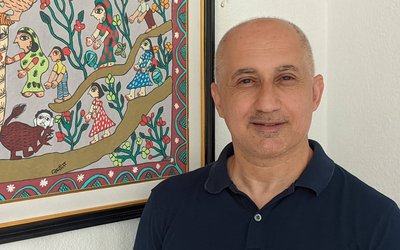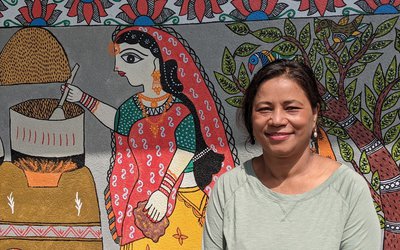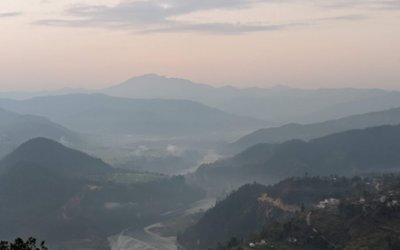At a time when there is a growing pressure to hold the elections for local bodies, DINESH THAPALIYA, joint secretary and spokesperson of Ministry of Federal Affairs and Local Development, spoke to New Spotlight on various issues faced by local bodies. Excerpts:
How do you see the importance of local bodies?
Local bodies are the institutions which are supposed to be run by the representatives elected by the sovereign citizens. However, these institutions are without elected representatives for the last ten years. It gives birth to major issues: first disarray in the root of democracy, denial of right to exercise the sovereignty, the questions of accountability is complex, weakening in accountability towards the people. Especially, the representation, ownership and involvement, access in the decision making process have badly weakened in the period. This is a theoretical question. In the absence of employees, the local bodies have failed to deliver services to the people. This situation is not there all over the country but there are reports in some parts. Of course, some good works have also taken place. Most important thing is weakening of discipline in development planning and the declining income and the coordination part is also weakening. The infrastructures built in the local levels are below the standards. One of the worst things is having to work under pressure of an unaccountable political mechanism. The situation is that the credit of success goes to political leaders and discredit goes to the employees. These kinds of reporting have been coming in different areas, but it is now reported widely. These kinds of report are coming due to public pressure as well as the recent decision of the Ministry not to tolerate impunity in the irregularities and corruption in the local bodies. The Ministry has already taken a number of actions against those involved in the irregularities and corruption. This has also disseminated the positive message to build the conducive environment for local bodies.
Recently, MIREST-Nepal released a report which has revealed so many things, among others, the holding of the elections for local bodies. How do you look at it?
The Ministry always takes such efforts, if they are done accordingly, in a positive manner. I agree that there is no way out other than to hold the elections for local bodies to make it accountable to the people. Even Deputy prime minister and Minister of Federal Affairs and Local Development Narayan Kaji Shrestha has made it clear that he is willing to hold the elections. This is his commitment. The Minister has already proposed to hold the local elections along with national elections.
Since there is still lack of agreement on the national and local elections, what is the Ministry considering to make it viable and appropriating institutions before the elections?
The high level decentralization commission in 1996 recommended the need for restructuring of the local bodies and even the ninth plan had recommended the need to look for its size and numbers. However, the process of restructuring has never taken place. The situation is that there is a VDC with 70 up to 85,000 population and municipalities from 6500 to 1.7 million population. We have such diversity. Our challenges now are how to make them viable, financially and on the management side. The second agenda is the elections, the third agenda is to constitute appropriate mechanism till holding the elections. We have already discussed on several models and alternatives. The Ministry has recently formulated the Local Development Resource Mobilization Working Procedure and this procedure has visualized all party and all group mechanism. There is an integrated development planning committee to look after the development and planning. The committee will include representation from all parties, employees, civil society members, private sector and representations from all walks of life and media making it the most inclusive unit to handle the local body in the interim period. This mechanism should be given responsibility of council, monitoring, assessment and work related to looking at the construction of infrastructure with long term implications. It should be given the right to decide and the execution part should go to existing administrative capability. This will be one of the good alternatives to make the local bodies effective till holding the elections.
At a time when the issues related to widespread corruption and failure of political mechanism have been surfacing, how do you say that forming another mechanism will solve the current problems?
I cannot say anything like that will happen. What we are losing is the lack of effective mechanism for check and balance. There was a check and balance when local bodies were under the elected representatives. Now, it has weakened. The question now is how to make civil oversight strong and this mechanism will fill the gap. Our aim is to make the civic monitoring system more strong. Our proposed mechanisms will handle this. There is also the need to handle the question of accountability and transparency. We have already developed some tools to make it accountable and transparent. The ministry has already made public hearing and social auditing mandatory and public the work completed by the local bodies through various media. We have already set up 38,000 ward people's forums and People's Alertness Center. These centers include the members from all walks of life including Dalits, Indigenous, women, poor and representatives from backward communities. We can improve the service delivery in case of making them effective. I am not stressing to make only one mechanism but also expressing that there is the need to make another mechanism also. As there already are employees at DDCs, VDCs and Municipalities for the execution of plan, adding planning body will definitely help to make check and balance more effective. There will be three tiers of institutions, plan approving body, executive body and monitoring body.
How much money is being spent through local bodies?
Local bodies generate over 4 billion rupees annually. Local bodies also get about Rs. 40 billion under central subsidy, including conditional and non-conditional subsidy, and for planning and social security. All this money does not go for use in development. According to the budget allocation, we spend almost Rs. 25 billion for the development purposes. This is a big money. Out of this, Nepal's development partners are providing over Rs. 11 billion as a grant and Rs. 3 billion for development and planning. The Ministry acknowledges the contribution of Nepal's development partners. We are also concerned about how to manage this amount. We are now trying to implement Public Expenditure Financial Accountability at local level analyzing to reduce fiduciary risk. With the support from Nepal's development partners, we are developing Nepal Portfolio Performance Review which involves management of local resources and makes local bodies more accountable. We are also working to trace the expenditure at the local level. We are also working to settle unsettled accounts. The government is more concerned about the financial matters at the local level. Our technical side is very weak.
How do you see the possibility of elections?
I am optimistic that there will be elections. From Supreme Court to the current political parities, all have expressed their commitments to hold the elections for local bodies. Federations of local bodies and civil society members have been actively lobbying for the elections of local bodies and there is some agreement among major political parties to hold the local elections and even deputy prime minister and Minister of Federal Affairs and Local Development Naryan Kaji Shrestha's recent commitment gives a sign of hope. He proposed even to hold the elections in June if there is a failure to hold the elections of CA. Even the present constitution proposes for interim elections for local bodies. So far as our ministry is concerned, we are always committed to hold the elections. There is the need to hold the elections with certain restructuring. We have started to restructure municipalities.
- TANAHU HYDROPOWER PROEJCT: A Significant Achievement
- Apr 15, 2024
- AMBASSADOR HANAN GODAR: Sharing Pain With A Nepali Family
- Mar 30, 2024
- VISIT OF KfW AND EIB TO NEPAL : Mission Matters
- Mar 25, 2024
- NEPAL BRITAIN SOCIETY: Pratima Pande's Leadership
- Mar 24, 2024
- NEPAL ARMY DAY: Time To Recall Glory
- Mar 15, 2024
















